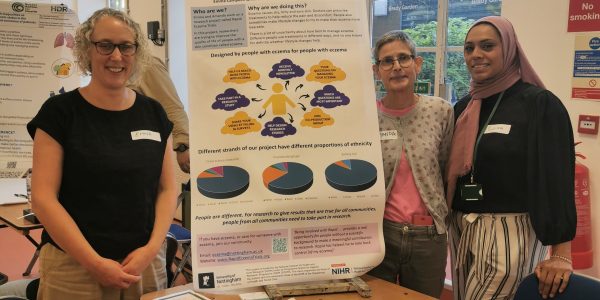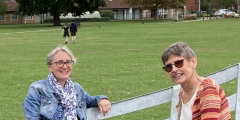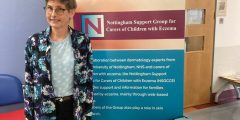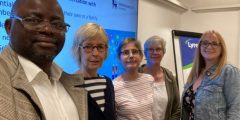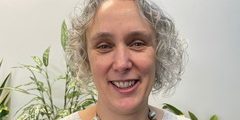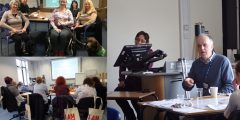Exploring community beliefs around clinical research
September 27, 2024
A wedding planner wouldn’t plan a wedding without input from the couple who are to be married… So why would anyone do health research without input from the populations that they’re hoping to help? Just like nearly weds will prefer certain arrangements over others, so will people find certain interventions more acceptable. And there’s no …
Talking eczema flare-ups
August 16, 2024
When studying something, we need to use words that everyone understands. That way, our findings make sense and can help people. Even common words like a “flare-up” in eczema can mean different things to different people. Everyone in the eczema world talks about “flare-ups” as a term for worsening of the eczema. But that is …
When the answers from health research are not what you want to hear
July 19, 2024
When the answers from health research are not what you want to hear, how do you make sense of them? Negative reactions, disagreement with the findings or disengaging with the research team will not make the results of a clinical trial change or disappear. But I have experienced all those responses when sharing results, which …
Being a Rapid Eczema Trials Community Champion
May 24, 2024
In Rapid Eczema Trials, Community Champions are people with experience of eczema, insight, local knowledge and networks who have been prepared to gather and share information in specific communities or localities. With their unique knowledge, Community Champions can act as a bridge between academic research and practical community-based solutions by giving people in their locality …
Addressing the Eczema PSP priorities with citizen science
May 2, 2024
In 2011, the Centre of Evidence Based Dermatology (CEBD) at the University of Nottingham worked with the James Lind Alliance to run an Eczema Priority Setting Partnership (PSP) exercise. The aim was to identify and prioritise uncertainties around how best to treat and manage eczema. Over 500 individuals took part. The exercise identified 14 priority …
Understanding the evidence behind eczema treatments
April 26, 2024
Would you like to know more about the research evidence that supports treatment decisions for people with eczema? If so, this evidence summary from the National Institute for Health and Care Research (NIHR) is a ‘must read’ for you. This article summarises the amazing research that has taken place over the last decade. It has …
Boosting study recruitment by engaging with Be Part of Research
March 28, 2024
We were all so excited when the Eczema Bathing Study opened to recruitment on 29 January. It’s the first study to come out of the Rapid Eczema Trials research programme and is trying to find out whether it’s better to have a shower (or bath) daily or just once or twice a week when you have …
What is the RAPID Eczema Trials project?
August 23, 2022
Researchers always wear white lab coats? Obviously, that is a stereotype, which is seldom correct. They are generally indistinguishable for the rest of the population. Open minded, curious, careful and rigorous. And with this “citizen science” project, the researchers can be anybody who has lived experience of eczema. Amazement, disbelief and excitement hit all of …
50 at 50: Ian Hall: Reflections on 35 Years in Medicine
December 10, 2021
In 1985 I successfully applied for a medical registrar position in Nottingham. I had decided respiratory medicine was going to be my chosen specialty, and Nottingham had a good reputation for its training programme. I’d never been to the city before I was appointed, and intended to stay for a couple of years then move on, but apart from a …
50 at 50: No research about me without me! Welcoming the patient and public voice to research
February 26, 2021
A lot has happened in healthcare and research over the last 50 years since the University of Nottingham Medical School was born. Not just in breakthrough treatments and diagnostics, blockbuster drug development and in tackling our first pandemic since 1918; but also in opening up medicine and healthcare to include the views and experiences of …

